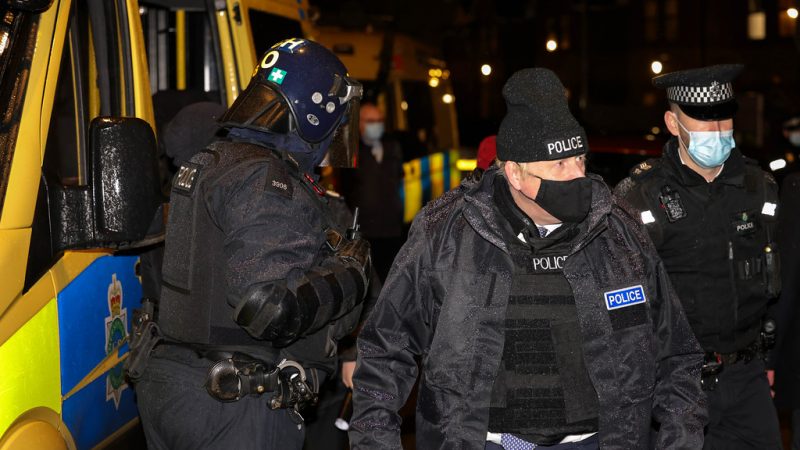
‘Look how tough I am’ was the government PR script for this week’s long-awaited drug strategy release. It was peak Boris Johnson, as he dressed up as a police officer and told the cameras he had “already rolled up about 1,500”. I think he was (wrongly) talking about gangs rather than spliffs, but the man does have a history. As usual, it’s one rule for the Prime Minister, another for the rest of us.
The real headlines should focus on the fact that the Tories have finally agreed to boost drug treatment by nearly £900m over the next three years. This is very welcome and long overdue, and testament to the work of brilliant campaigners and activists across the country. The Conservatives’ reversal of their own cuts should have come with an apology, though. Without recognising the harm caused by decimating treatment services, is it possible to learn any lessons?
The simple fact is that when Labour was in power, drug treatment was funded properly. The Tories took that away. Funding cuts have been directly linked to overdose deaths, which have risen year-on-year for eight years to a record high. The real cost of starving treatment services of cash has been the loss of another life every four hours in England. Restoring some of the funding now is too late for too many.
But it is positive that the government has given its support to diversion schemes, pioneered previously in local areas in the face of national inaction. These schemes are formal ways to divert those suffering from addiction away from the criminal justice system and into proper treatment.
The schemes recognise that there is a world (literally) of evidence, which says that individuals and society benefit from drugs being treated first and foremost as a health issue, rather than a criminal one. Ironically, when the Scottish government announced its diversion approach earlier this year, it was the Tories who were falling over each other to call it “soft touch” and “back-door decriminalisation”.
But Labour in power was ahead of the SNP on this. Ron Hogg, Labour’s former Durham Police Commissioner who I had the privilege of working for, was a powerful advocate for the right support instead of the wrong conviction. Ron sadly passed away in 2019, but would have been delighted that the government is finally waking up to what works. Diversion schemes reduce reoffending rates and the seriousness of offences committed. The same cannot be said for prison.
The Tories have rebranded these efforts as “tough consequences schemes”, which suits their macho rhetoric and fear of anyone suggesting they might sympathise with people with addictions. A small but nevertheless welcome pot of £9m over three years will help to introduce and expand these schemes.
Less welcome are the vast millions being poured into tried, tested and failed ‘enforcement’ work, aimed at organised crime groups. This is despite the Home Office’s own extensive international research in 2014 confirming that there is no link between levels of enforcement and levels of drug use. The Home Office’s 2017 evaluation of their previous drug strategy also concluded that “there is, in general, a lack of robust evidence as to whether capture and punishment serves as a deterrent for drug use.
So if the Home Office isn’t listening to its own evidence (or lack of), then who has it been talking to? There was no public consultation, despite this being a major ten-year strategy. There were no opportunities for those most affected by drugs and drug policy to have a say in these decisions that could shape their lives. There was no space for experts to submit evidence of what works that might not chime with Tory ideology. Of course the public were overlooked too, allowing the government to assume that all we want is to be fed the same tired ‘tough on drugs’ lines that we seem to have been enjoying for 50 years.
Our own Labour Campaign for Drug Policy Reform consulted much more widely last year, drawing up a strategy that involved 750 members of the public and interactive public meetings. Labour shadow ministers are encouraged to champion this approach, which produced a seven-point plan to save lives, reduce harm and end the failed war on drugs.
Labour MPs are rightly challenging the government’s record on drug policy, but they must also challenge its narrative. This means resisting the orthodoxy of ‘enforcement’ and political posturing that drives vulnerable people into greater vulnerability. Our party exists to fight for a fair and equal society. It is difficult to find any group of people more marginalised, stigmatised and unfairly treated than those suffering from addiction.
The Labour frontbench is a government-in-waiting. If we win at the next election, there will be suffering in our country that we have the chance to relieve. There will be lives at risk on our streets that we have the chance to save. Why wouldn’t we?




More from LabourList
Letters to the Editor – week ending 15th February 2026
‘Labour council candidates – it’s tough, but all is not lost’
‘Labour won’t stop the far right by changing leaders — only by proving what the left can deliver’